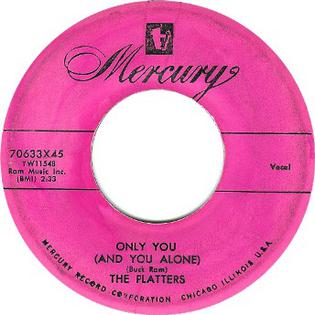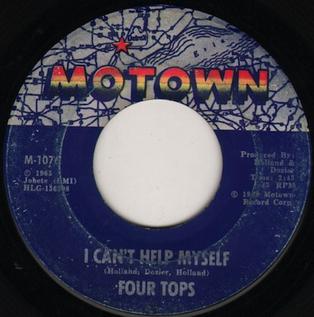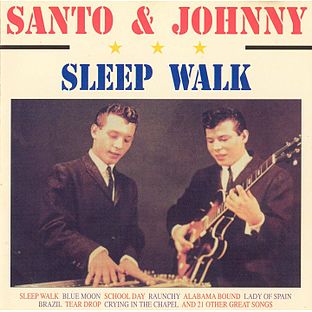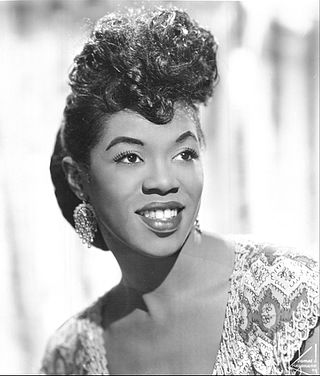Related Research Articles

"Only You (And You Alone)" (often shortened to "Only You") is a pop song composed by Buck Ram. It was originally recorded by The Platters with lead vocals by Tony Williams in 1955.

"I Can't Help Myself" is a 1965 song recorded by the Four Tops for the Motown label.
"Come Softly to Me" is a popular song recorded by The Fleetwoods, composed of Gretchen Christopher, Barbara Ellis, and Gary Troxel, who also wrote it. The original title was "Come Softly", but was changed en route to its becoming a hit. Bob Reisdorf, the owner of Dolphin Records, which in 1960 changed to Dolton Records, was responsible for the title change. He thought that "Come Softly" might be too obvious and considered risqué, so he had it changed to "Come Softly to Me." The title phrase never appears in the song's lyrics.

"Since I Don't Have You" is a song written and composed by Jackie Taylor, James Beaumont, Janet Vogel, Joseph Rock, Joe Verscharen, Lennie Martin, and Wally Lester. It was first a 1958 hit single for the doo-wop group the Skyliners on the Billboard Hot 100. Country music singer Ronnie Milsap had a hit with the song in 1991. American hard rock band Guns N' Roses also had some success in 1994 with their version of the song which reached the top 10 on the UK Singles Chart.

"Wooden Heart" is a pop song recorded by Elvis Presley. The composition is based on a German folk song "Muss i denn" and it was featured in the 1960 Elvis Presley film G.I. Blues. The song was a hit single for Presley in the UK Singles Chart, reaching No. 1 for six weeks in March and April 1961.
"Why" is a hit song recorded by Frankie Avalon in 1959. It reached No. 1 on the U.S. Billboard Hot 100 chart published on the week of December 28, 1959. It was Avalon's second and final No. 1 hit.

"I'll Never Fall in Love Again" is a popular song by composer Burt Bacharach and lyricist Hal David that was written for the 1968 musical Promises, Promises. Several recordings of the song were released in 1969; the most popular versions were by Dionne Warwick, who took it to number 6 on Billboard magazine's Hot 100 and spent three weeks topping the magazine's list of the most popular Easy Listening songs, and Bobbie Gentry, who topped the UK chart with her recording and also peaked at number 1 in Australia and Ireland, number 3 in South Africa and number 5 in Norway.

"Under the Boardwalk" is a pop song written by Kenny Young and Arthur Resnick and recorded by the Drifters in 1964. It charted at number four on the Billboard Hot 100 chart on August 22, 1964. The song has since been covered by many other artists, with versions by Bette Midler, Sam & Dave, the Tom Tom Club, the Rolling Stones, Billy Joe Royal, The Beach Boys, Bruce Willis, Bad Boys Blue, John Mellencamp and Lynn Anderson all charting in the United States or overseas. The song ranked number 487 on Rolling Stone's list of The 500 Greatest Songs of All Time in 2004 and number 489 in 2010.

"I Won't Last a Day Without You" is a song by The Carpenters with lyrics written by Paul Williams and music composed by Roger Nichols. It was released in the U.K. in September 1972, paired with "Goodbye to Love" as a double-A side. The single reached No. 9 and spent 14 weeks on the chart. It was later released in the U.S. and became a hit single for them in 1974, reaching No. 11 on the Billboard Hot 100 chart and number one on the easy listening chart. It was the Carpenters' ninth No. 1 on the easy listening chart.

"Sleep Walk" is an instrumental song written, recorded, and released in 1959 by American instrumental rock and roll duo Santo & Johnny Farina, with their uncle Mike Dee playing the drums. Prominently featuring steel guitar, the song was recorded at Trinity Music in Manhattan, New York City. "Sleep Walk" entered Billboard's Top 40 on August 17, 1959. It rose to the number 1 position for the last two weeks in September and remained in the Top 40 until November 9. "Sleep Walk" also reached number 4 on the R&B chart. It was the last instrumental to hit number 1 in the 1950s and earned a gold record for Santo and Johnny. In Canada, the song reached number 3 in the CHUM Charts. In the UK it peaked at number 22 on the charts.
"There! I've Said It Again" is a popular song written and published by Redd Evans and David Mann in 1941. In early 1945, Vaughn Monroe and his Orchestra released Victor 20-1637, which reached the number one position on the Billboard's National Radio Airplay chart for five straight weeks, then no.2 for six more weeks, and a total run of 29 weeks. It finished 1945 as the no. 4 record of the year.
"You're the Reason" is a song by Bobby Edwards, released as a single in the United States in 1961. The song reached number four on the Hot C&W Sides chart and number 11 on the Hot 100 chart.
"Funny How Time Slips Away" is a song written by Willie Nelson and first recorded by country singer Billy Walker. Walker's version was issued as a single by Columbia Records in June 1961 and peaked at number 23 on the Hot C&W Sides chart. The song has been featured in several live action films and television shows, such as in the first episode of the second season of AMC’s Better Call Saul and in the 2020 Netflix drama The Devil All the Time.
"Please Help Me, I'm Falling" is a 1960 song written by Don Robertson and Hal Blair and first recorded by Hank Locklin. The single was Locklin's most successful recording and was his second number one on the country charts. "Please Help Me, I'm Falling" spent 14 weeks at the top spot and spent nine months on the country chart and crossed over to the Hot 100 peaking at number eight.
"Walking the Floor Over You" is a country music song written by Ernest Tubb, recorded on April 26, 1941 in Fort Worth, Texas, and released in the United States that year.

"Morning Side of the Mountain" is a song written by Larry Stock and Dick Manning and first recorded in 1951 by Tommy Edwards. It settled at #24 on the pop chart. Edwards re-recorded it in 1959, reaching #27 on the Billboard Hot 100. The re-release was featured as the B-side of Edwards' other hit, a cover of Johnnie Ray's 1952 success, "Please Mr. Sun."

"Fools Fall in Love" is a song by Jerry Leiber and Mike Stoller. It was originally recorded by the Drifters, who took it to number 10 on the R&B chart in 1957. The song reached number 69 on the Billboard Hot 100.

"I Guess the Lord Must Be in New York City" is a song written and recorded by singer-songwriter Nilsson in 1969. A track from his fourth studio album, Harry, it became his second charting single.

"Don't Throw It All Away" is a song written by British musician Gary Benson and first released by the Shadows on their 1975 album Specs Appeal. Benson released his version as a single later the same year, which reached number 20 on the UK Singles Chart in the fall of 1975.

The singles discography of American Jazz artist Sarah Vaughan contains 89 singles, two promotional singles and seven other charted songs. Vaughan recorded her first singles in 1946, with her first release being "If You Could See Me Now". Soon after, she saw her first major chart success on the Billboard pop list with "Tenderly" and "It's Magic." Moving to Columbia Records, she had further pop hits in the late 1940s with covers of "Black Coffee" and "Nature Boy." She had her second top ten hit in 1950 with "(I Love the Girl) I Love the Guy." Vaughan moved to Mercury Records during the 1950s and recorded more pop music. At Mercury, she had her biggest chart success, with the top ten hits "Make Yourself Comfortable" and "Whatever Lola Wants." In 1959, Vaughan's single "Broken Hearted Melody" reached number seven on the Billboard pop chart and became an international success, becoming the biggest single of her career.
References
- ↑ Breihan, Tom (February 13, 2018). "The Number Ones: The Fleetwoods' "Mr. Blue"". Stereogum . Retrieved June 6, 2023.
'Mr. Blue' was more a product of the pop-star studio system, and it wasn't nearly as good of a fit.
- ↑ "BMI | Repertoire Search". Archived from the original on January 18, 2013. Retrieved May 4, 2021.
- ↑ Whitburn, Joel (2004). The Billboard Book of Top 40 Hits: Eighth Edition. Record Research. p. 230.
- ↑ Whitburn, Joel (2004). Top R&B/Hip-Hop Singles: 1942-2004. Record Research. p. 208.
- ↑ "Billboard Hot 100 60th Anniversary Interactive Chart". Billboard. Retrieved December 10, 2018.
- ↑ Joe Meek, Telstar: The Hits of Joe Meek, Sanctuary Records Group Ltd., London, 2006
- ↑ "DAVID MACBETH | full Official Chart History | Official Charts Company". Officialcharts.com. Retrieved May 4, 2021.